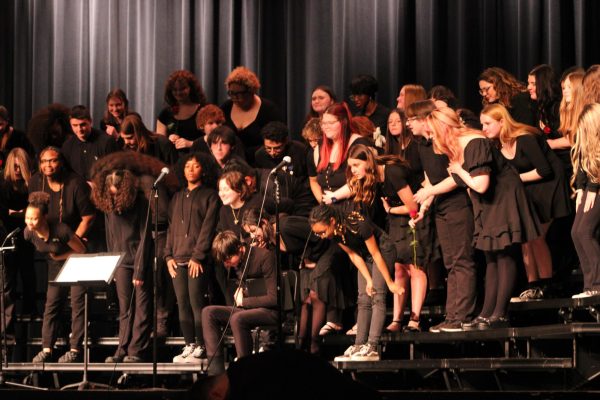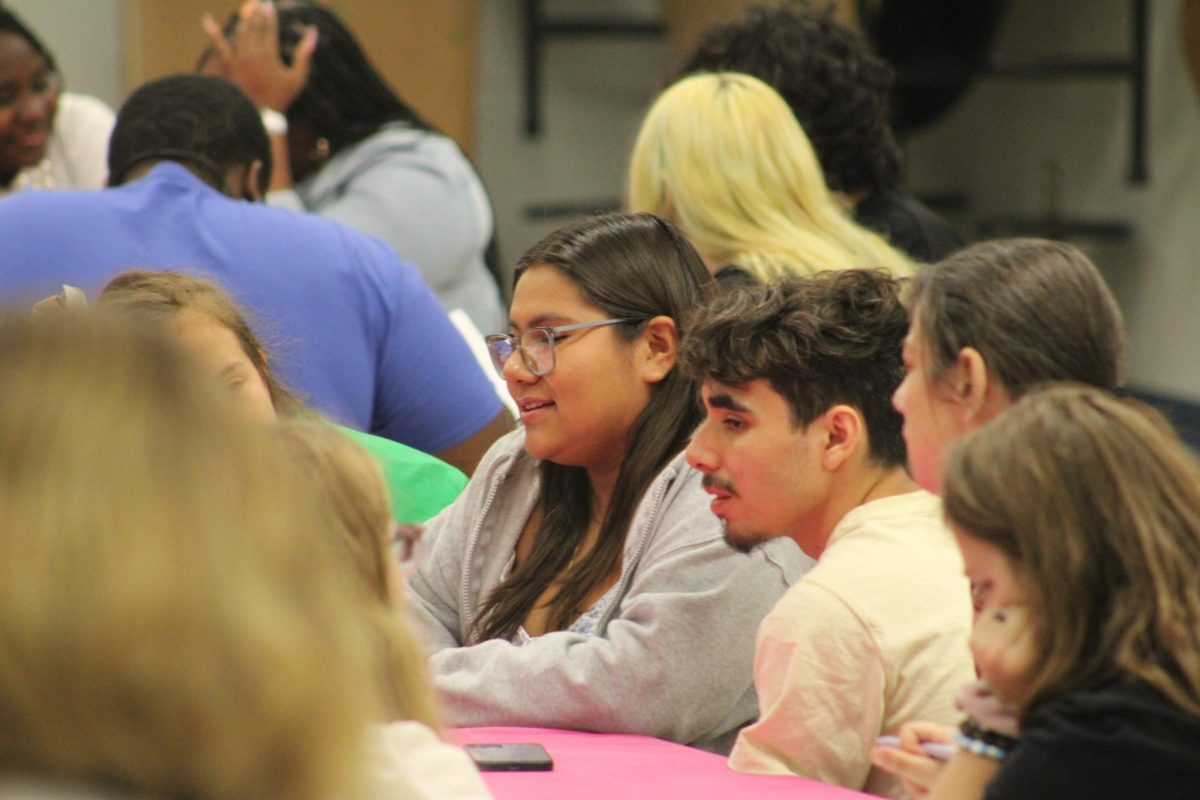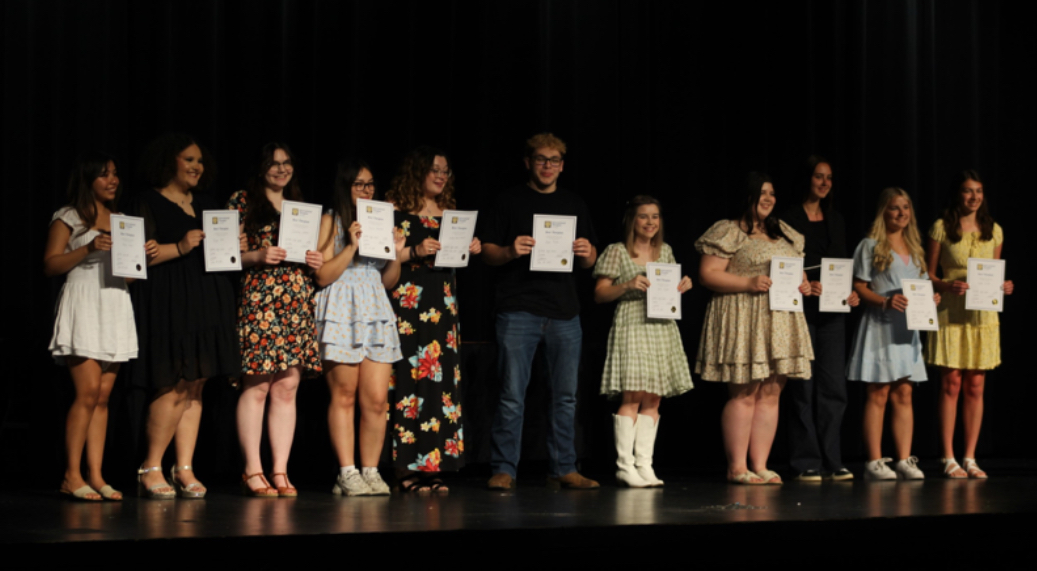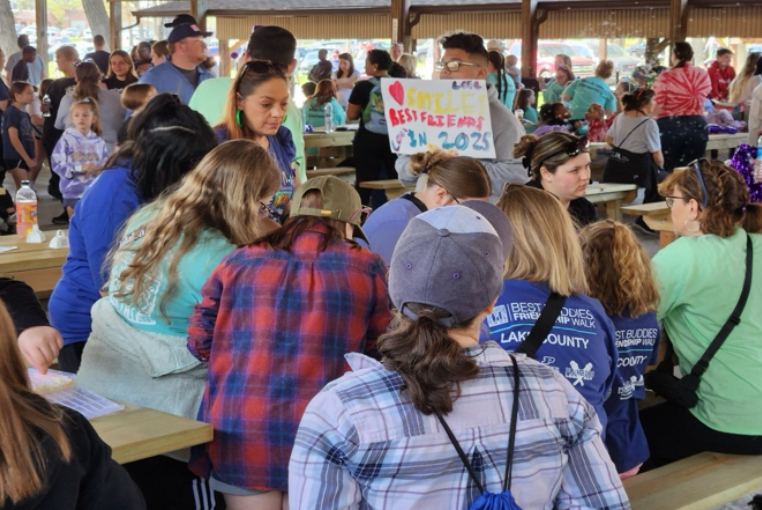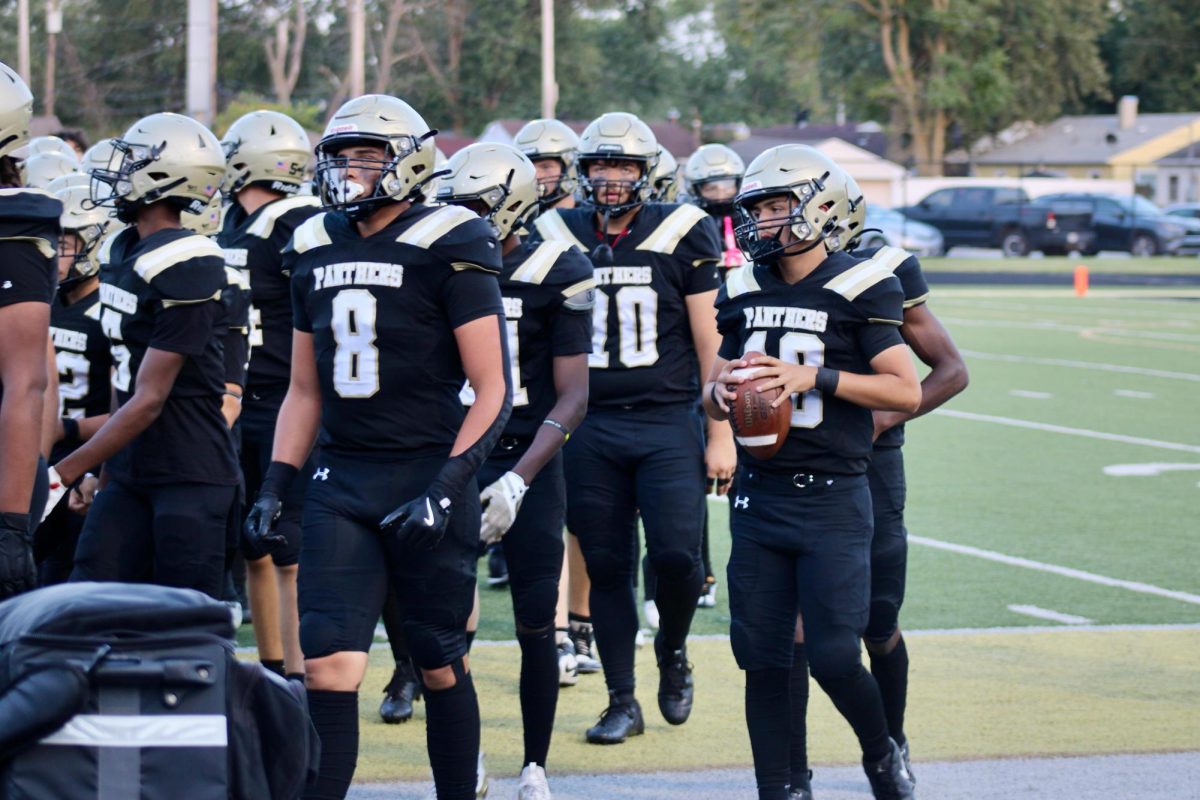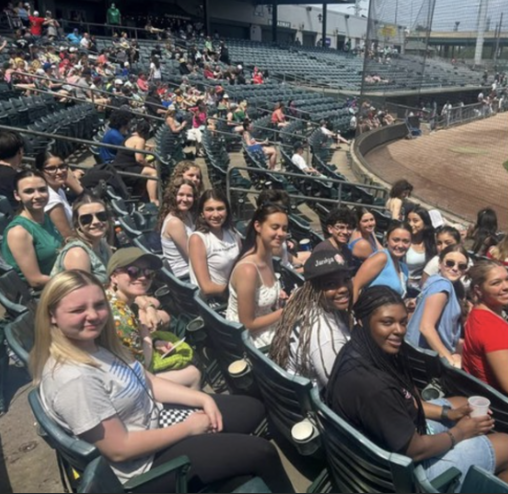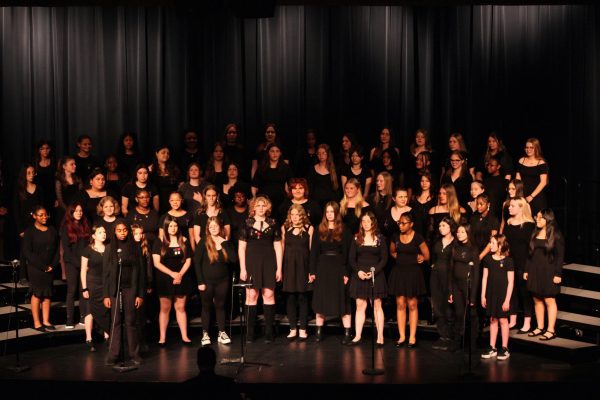
The performing arts season is finished at Griffith Jr./Sr. High School, which means that the middle and high school choirs can now rest—at least, until next school year. Over the course of this school year, the choir program has participated in numerous events, received several awards, has seen its students grow as musicians, and is set to keep on growing—with insights from choir director Vincent Dore and three ISSMA state soloists.
As of now, the Griffith music program is comprised of about 86 middle schoolers and 55 high schoolers.
Back in October, the performances were beginning, and the music programs tried out something new for their Fall Showcase: Music Nights. On October 1, the community watched as the high school band and choir students took the stage in the same concert, and even performed together simultaneously, carrying out a feat that had never been tried before. On October 3, the middle school music programs followed suit.
Next up in the month of December, the choirs were getting into the holiday spirit. They donned Santa hats and took the auditorium stage once again on December 12 for their winter concert. During this month, choir students also participated in multiple caroling events throughout the community at the winter PTC event, the Senior Citizen Center, and the elementary schools.
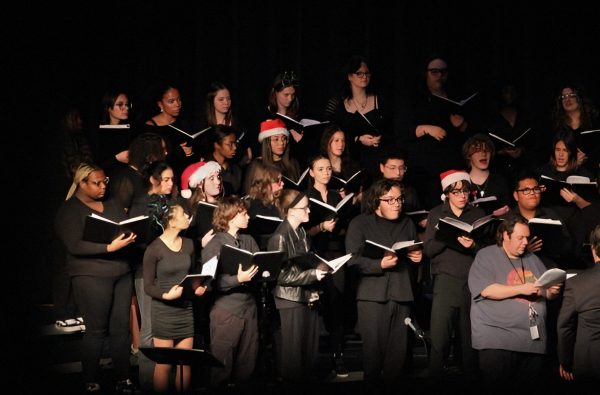
With the turn of the new year, there were two events coming up: the middle school’s production of Disney’s Frozen Jr. Musical, and Indiana State School Music Association (ISSMA) competition season.
From January 31 to February 2, the cast of about 35 students performed the 60-minute Broadway Junior adaptation, marking a significant milestone in Griffith Theatre Company history: the first middle school musical, as far as all of the directors could recall. Of the 35, about 20 were already involved in choir, and about 10 more have taken an interest since then. The choice to try out a musical was not made without consideration of how far the middle school choir program had come. Dore said, “since I’ve gotten here, we’ve really pushed the music ability on them. They had grown so well, and they were performing well at their contests and their competitions—and so when the directing staff asked me, ‘would it ever be possible to do a middle school musical?’ I said, ‘100%.’”
On February 8, choir students participated in the regional ISSMA Solo and Ensemble Contest at Lowell Middle School. The premise of this contest was to showcase individual musicianship, as students could choose to perform a piece solo or with a small ensemble. Those who competed in the Division I category and earned a Gold rating moved on to the State Solo and Ensemble Contest on February 22 at Perry Meridian High School in Indianapolis. Griffith sent three soloists to State—a jump from the usual one or two in previous years.

Senior Paige Hale earned Silver at the state competition. As she prepared for her ISSMA performances, she had felt extremely nervous, which was a common experience among all three contestants. To help keep herself calm and perform well, Hale kept the tracks provided by Dore and practiced them to ensure that she was well prepared for her big day ahead.
After winning Silver, Hale was surprised by the news of her accomplishment, but it was a pleasant surprise. Once she had left the state competition, she went home to recharge by taking a nap before enjoying time with her best friend. Hale acknowledged the importance of having good luck charms with her. She wore a microphone necklace gifted by her father and treble clef earrings from her grandmother, which provided her comfort along with motivation. Having been in the choir for three years, she valued the journey and growth that she carried with her after having experience with the program. Hale often reminded herself, “if I wasn’t meant to do it, then I wouldn’t be doing it.”
Junior Natalie Wadkins earned Gold With Distinction at State. Minutes prior to her performance, Wadkins had become exceptionally anxious due to the contestant before her receiving a silver medal—and the reason was that she’d overheard the judge express that she had wanted better dynamics from the prior soloist, which was one of her biggest concerns for herself.
To ensure that her performance would be exceptional, Wadkins held a strict routine that consisted of her steaming her voice every few hours, drinking hot water and tea, avoiding dairy products, and continuously running through vocal warmups.
To celebrate her achievement, she treated herself to ice cream, indulging in a dairy product for the first time since she began preparing for performance, as she avoided them to protect her voice. With ten years of choir experience, and vocal experience for as long as she could remember, Wadkins’s commitment to her music career was evident in her performance and accolades. She stated, “this victory is more than a title. It’s proof that dedication pays off.”
Junior Jeremiah Fuentes earned a perfect score for his performance. In the weeks leading up to his performance, Jeremiah engaged himself into rigorous practice by singing his track repeatedly until every note was perfected. The pressure had begun to rise as the days went by, which led him to start feeling increasingly anxious and frantic about how he would be perceived. However, after securing gold, his nerves became composed once again and turned into excitement.
His results and medal were a testament to the effort and dedication he put into the time before and during his piece. Fuentes had been a member of the choir all throughout high school and for one year in middle school, and his passion for music had begun even earlier. To celebrate his performance, Fuentes and his cousin had a celebratory meal at Panera to bring the day to an end.
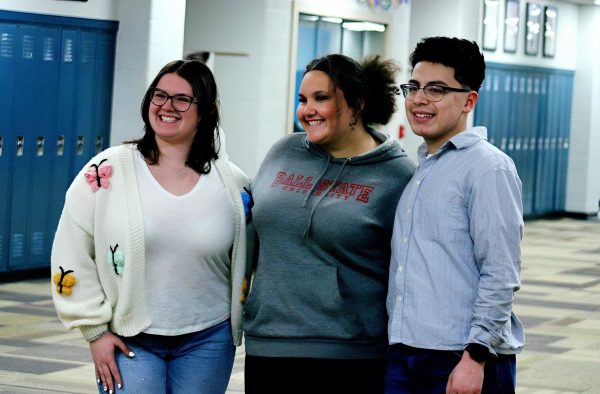
After the State Solo and Ensemble Contest, up next were the organizational ensemble contests. These involved full ensembles from both the middle and high school and additional evaluations on sight-reading. The middle school choir performed at Robert Taft Middle School on March 15, earning a Gold rating, and the high school chorale performed at Kankakee Valley Middle School on April 12, earning a Silver rating.
Thus, the ISSMA competition season was over, and the school year had begun to wrap up. However, there was just one more competition left for the combined high school choir: the annual Music in the Parks Festival at Six Flags Great America. Every year, the choir students take a field trip at the end of the year to compete at the festival, but also to spend the entire day with their friends going on rides at Six Flags. This year, the festival was on May 17, and they received best in division with an Excellent rating.
The last event of the year was the Spring Pops concert on May 21. Many students received the chance to perform solos—not in a usual solo performance style, but stepping up to the mic to sing a few lyrics while the rest of the choir waited to join back in. The choirs performed songs from popular media and artists such as Wicked, Michael Bublé, and Journey. The outgoing seniors were also recognized at the end of the concert.
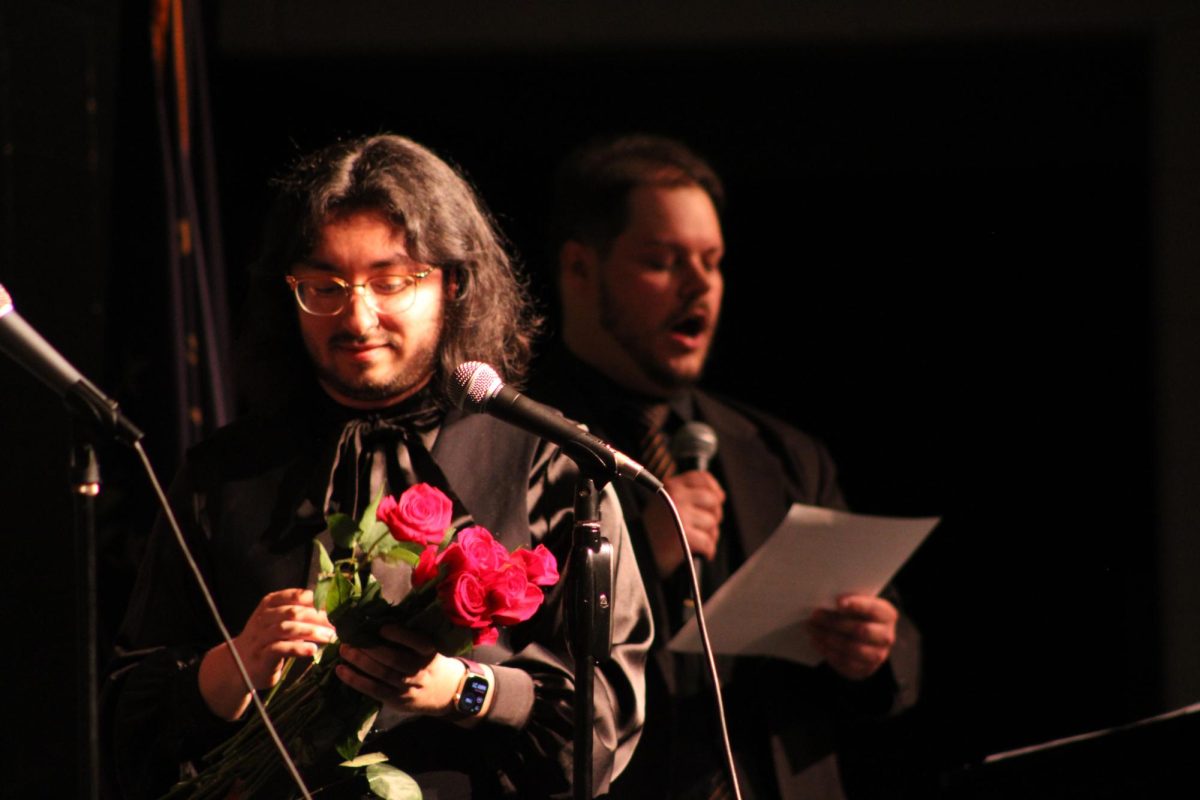
Dore commented on numerous aspects of the choir program during an interview.
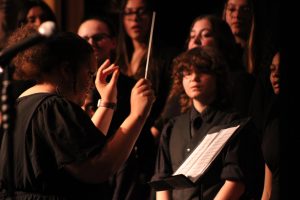
His most important goal this year was to especially facilitate independent musicianship at all levels. “When I first got here, they were very much leaning on me as their teacher. I wanted them to realize that they didn’t need me to always look over their shoulders, that they had the ability to do it all on their own: read music, write music, understand music,” he said. The choir program has incorporated many aspects that put the students at the forefront, especially during the concerts. When performing in the auditorium, students introduced the pieces, led and conducted songs, and one student, Hale, conducted a song. When practicing in the choir room, students led warmups, picked the soloists, picked who did the readings, and provided feedback to their peers.
He reflected on what his students excelled at. For his middle schoolers, he noted their opportunity-taking. “I joke with my high schoolers, ‘my middle schoolers are hungry.’ They want to perform, they want to be on stage, they want to do these shows.” He was especially impressed with the girls: out of the 65 girls, 62 auditioned for solos for the Spring Pops concert. As for high school, Dore remained impressed with their music literacy, owing to their musicianship. “I think my biggest accomplishment with high school would be how much they could kind of do in small group settings…their small group learning is really quick and efficient.” Similarly to middle school, many high schoolers auditioned for solos for the spring concert. Overall, Dore took the most pride in his students’ confidence in working with music and being independent musicians.
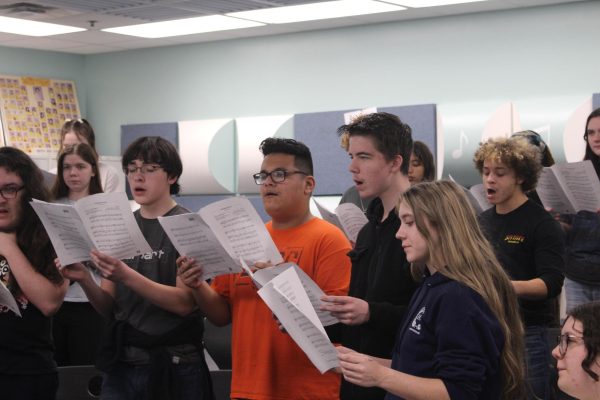
Dore spoke on what his responsibilities are as choir director. “People don’t realize that it’s not just getting the kids on stage and singing the songs. It’s, ‘who’s running the lights? Did we get the microphones requested? Did we request the auditorium space? Do I have parents to work the lobby? Do I have all the paperwork filled out? Did I get the money from central office? What about the programs?’ It’s the little details that make it go from the audience just sitting down and listening to kids sing, to an actual performance.” He also acknowledged what he felt that his largest responsibility was. “When I’m with them, I want to make sure that they are safe, they’re cared for, they feel like they’re in a good environment, they know they’re ready to explore their music…so making them feel that is probably, honestly, one of the biggest things that makes me feel nervous.”

When Dore was asked to describe the whole choir program, he said, “the sky’s the limit. I think next year is going to be our biggest year yet.” He anticipated the combined foundation of music that his students will have; it’ll be the first year that the students he’s had all throughout middle school will be joining ranks with the high schoolers, all the while his upperclassmen will also have had a substantial deal of experience by then. “We’re going to be able to do so much more, so much faster, so much better.”
Dore discussed many goals he had in mind for the program. He envisioned having another choir teacher to co-teach alongside him. He placed emphasis on a male/female teaching duo, as he acknowledged his limitations towards teaching his female students, due to the differences in vocal anatomies. “I’m highly educated in it…but someone who’s lived it is always going to be a better person to teach it.”
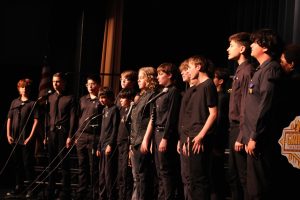
He also anticipated having two middle school competition choirs—one comprised of only sixth graders and the one comprised of seventh and eighth graders. Dore planned to maintain the high school’s concert choir and chorale and develop the chorale into a women’s ensemble and a men’s ensemble. Lastly, he wished to implement an honors credit pathway for students in chorale, as that was the reason why he lost some of his upperclassmen over the years. “They want the high GPA for college, which I totally understand.”
Lastly, Dore stressed the importance of trying things out during the high school years, as it would get increasingly difficult to have the time to try new things later on in life. “Try it. Just try it. I’ve never in my life met an adult who said to me, ‘I’m so glad I wasn’t in band or choir in high school. I’m so glad I wasn’t in band or choir.’ They all say the exact opposite: ‘I wish I tried it. I wish I tried it.’” He also admitted the fact that choir may not be everyone, and that if someone found out that they didn’t enjoy the program, he would help them talk to guidance to switch out. But, “if you like it, even a little bit—what a great way to get part of your day done at school. You can spend 45 minutes with your classmates, with your friends, just singing and making music.”
